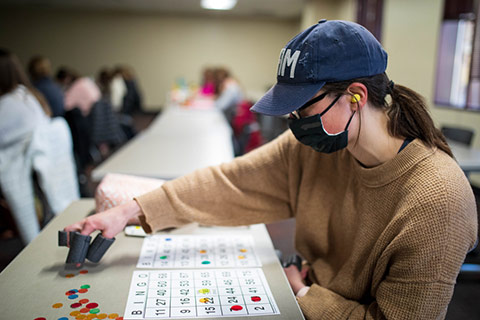
How do bingo and higher education intersect? Students in the Master of Science in speech language pathology program at Samford University utilized the game in their cognitive communication course for an aging simulation.
"I created kits for each student including foam that they put on their fingers, earplugs and reading glasses,” said Karen Thatcher Flynn, associate professor. “The foam slides over their fingers, and that decreases their dexterity in their hands. The earplugs simulate a hearing loss and I place black electrical tape over the reading glasses simulate blurred vision."
Due to COVID-19, the simulation followed social distancing guidelines, and masks had to be worn. According to Thatcher, this created an additional simulation of decreasing some ability to communicate with each other verbally.
"I manipulate the environment, sometimes I turn the lights down low, which again decreases their ability to see. Sometimes I present the numbers very slowly, and I overarticulate. Sometimes I go a lot faster, and sometimes I am loud; sometimes I am soft," Thatcher said. "Some of them have great big boards that have nice black letters on them and sometimes I have smaller ones."
Students play the game for about an hour under simulated conditions. According to Thatcher, they start to experience the difficulty that some older people may have in life.
"It's really interesting to watch them. They're all excited at first; they think this is going to be fun," Thatcher said. "And then you start to see the frustration as the hour goes on.”
Thatcher has been offering this simulation in her teaching for approximately 15 years. According to her, graduate students say that it is one of the most beneficial activities that helps them understand some of the difficulties that the older generation face.